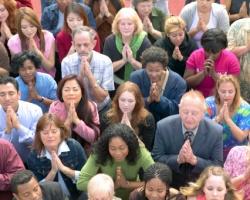I believe the Protestant Principle has helped to fragment the church more than any other factor to date. What originally started as a reformation movement to get back to the heart of the Christian faith has served as a divisive tool Satan uses to divide the church. For example, race is a term that has been used to classify people based on regional or national origins. We are created in the image of God. We each have infinite value, dignity and worth. As humans, we have this need to classify things. This might have come from the task that Adam was given to name and classify all the animals. We feel we need to put labels on things and people in order to understand them. This has affected the church in some profound ways.
We can see this as we look at the different denominations. Certain groups attract or repel certain races. I would have hoped we would have gotten past this in the 21st century, but it is very subtle. If you look at most congregations across America, you can see a definite breakdown based on race. People tend to congregate with people who are similar to themselves. It is almost a subconscious thing. For instance, Southern Baptist churches are predominantly caucasian. When I was serving in a Southern Baptist church in North Carolina, we had a food pantry that served our local community. One afternoon, we had an African-American couple come in for assistance. After I met with them for a while, I helped them carry the food to their car. As they were about to leave, I invited them to church the next Sunday. The lady looked at me and said, “We cannot come here.” I said, “Sure you can. Our doors are open to all.” She said, “You mean you let people like us worship here?” My heart broke. She knew the attitude of most Southern Baptist churches. She might have experienced it firsthand. If we are going to be churches that reach across culture boundaries, we must not let race or the color of one’s skin enter the equation. Jesus died for all, and He commanded us to take the gospel to all nations. We must be willing to help others put their prejudices behind them and strive to be the disciples we were called to be. We must be willing to work to build unity and cooperation among denominations in order to work for greater kingdom purposes.
Christianity is far more than a system to be taught or a set of teachings to believe. Martin Luther didn’t believed the church to be a place to participate in programs. He believed the community is the church, and the Christ-like, compassionate life lived before others perpetuates God’s transformational movement. Additionally, those they influence sense the opportunity and commitment to pass on this legacy to the next generation because it has been engrained within them. They have been taught and mentored that their gift to the next generation is the instilling of a Christ-like way of life into their own children through their own model of Christ-likeness.
Is a move of God such as this possible? I believe He wants to bring His body—His transformed followers of Christ—together in prayer, unity and in the power of His Spirit to minister to the spiritual, physical and relational needs of others in a cradle-to-grave strategy. God has not called Christians to engage in a cultural war simply to protect and preserve a moral way of life. God has called us to be transforming salt and attractive light to the world—to bring hope and healing to a needy world. Jesus said our light is “like a city on a mountain, glowing in the night for all to see. Don’t hide your light under a basket! Instead, put it on a stand and let it shine for all. In the same way, let your good deeds shine out for all to see, so that everyone will praise your heavenly Father” (
In general, I am submissive to authority. I work well with anyone and generally get along with those in authority over me. Although there are times when I will stand up to authority if I feel he or she is making a decision that goes against Scripture or against the church’s mission or vision. I always do it respectfully, but it can be seen as problematic by some. One of my weaknesses is dealing with conflict. I need to be able to deal with various conflicts. I need to be able to choose my battles wisely. I must determine which battles are important enough to fight and determine which battles will not be won and learn how to say, “OK, you win. Let’s move on and serve God.”




